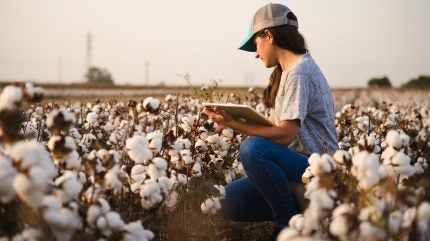
Sourcery’s Impact and Assurance Programme, which was focused on collecting “deep and robust” primary data of commercial scale cotton farmers in India and Pakistan, has uncovered five key insights on how to deliver transparency and traceability within the fashion supply chain.
The company explained its “first-of-its-kind” initiative confirmed the importance of more acccurate, robust and equitable data collection to provide the verified impact the apparel sector demands.
The programme and its three-year development period that led to its commercial deployment exposed the limitations of the apparel sector, such knowing who growers are and where they are located.
The study, which took place in the Indian states of Maharashtra, Madhya Pradesh, Gujarat, Rajasthan and the Punjab province in Pakistan, found “significant inaccuracy in grower data” namely the GPS or geocodes used to identify growers enrolled in various programmes.
Sourcery pointed out this data is crucial for extension service teams to deploy training and services as well as for traders to purchase fibre from growers who claim to be adopting sustainable practices.
Its findings highlight that using Polygon mapping within Sourcery’s robust digital farm mapping system offers a more precise and dependable approach to providing accurate farm data. It described this as a “valuable asset” the sector currently lacks and desperately needs to ensure transparency, traceability and verified impact on the farms and in the value chains where cotton is traded.

US Tariffs are shifting - will you react or anticipate?
Don’t let policy changes catch you off guard. Stay proactive with real-time data and expert analysis.
By GlobalDataIt also found that initial investment and training are necessary to properly engage, train and communicate the benefits to growers, field teams, aggregators and gins for accurate and digital mapping.
Sourcery believes this will be much simpler and easier to scale with its forthcoming Connect App. The scaling of its Impact and Assurance Programme should bring the required investment in extension service teams, capacity building, and improved infrastructure to ensure ground teams are well-equipped to support farmers at scale and collect accurate data while also ensuring growers adopting and using the Connect App will be recognised and rewarded for their efforts.
Sourcery’s grower engagement director Ruchita Chhabra stated: “We can’t measure what we can’t see. By moving beyond inaccurate GPS data and using digital polygon mapping, we can ensure greater visibility.
“But it’s not just about technology – it’s about building trust. We’re committed to creating a system that works for everyone.”
Chhabra sees the first learnings as a stepping stone, and added: “We’re training extension service teams now, but the goal is to empower growers to share data independently in the future. We want to incentivise data sharing that directly benefits growers and manufacturers–particularly in terms of financial benefits. By working together, we can create a future where accurate data empowers everyone in the cotton supply chain.”
Five key learnings from Sourcery’s cotton transparency programme
- Beyond GPS: While GPS coordinates are commonly used for farm identification, early learning from the programme revealed their limitations in accuracy. A more precise and reliable alternative is polygon mapping, which traces cadastral boundaries using a smartphone app and uses additional digital identification information through multiple interactions and data triangulation to create a more dynamic view of growers, farms and their communities.
- Incentive-driven data sharing: The early programme learnings revealed that farmers are more likely to share data when they see a direct financial benefit. They have often felt that they have given their data for free in the past, only to receive unfulfilled promises of access to business linkages, agricultural inputs, equipment, larger margins or other benefits—few of which translate into a clear business case for most growers to adopt and continue improving their commercial and environmental progress.
- Investment in grower engagement: Effective grower engagement requires investment in professional extension services teams, including larger teams, to cover more farmers, focus more on individual grower and community capacity building, agronomic support, and providing improved infrastructure such as agronomic and community centres, etc. This ensures ground teams are well-equipped to support growers at scale, collect accurate data, and link the data with market buyers who ultimately pay for the right to use the data under license.
- Adapting to ground realities: To address grassroots challenges like limited smartphone usage and network availability at the village level, data collection methods must be tailored to growers’ way of working, and crop cycle and are sensitive to capabilities to ensure that data collection is not a burden, but rather an opportunity to make more revenue, provide critical insights and feedback to improve their crop and grow their businesses.
- Transparency and inclusion: The early learning of the programme has highlighted the importance of transparency and inclusion, fostering trust with growers, aggregators, verifiers, processors, and merchants by encouraging collaboration and more accurate data sharing that benefits everyone from grower to retailer. This commitment to transparency and inclusion builds trust and leads to more robust and accurate data where data becomes an asset alongside the crop itself.
Sourcery is inviting all growers and grower organisations across India, Pakistan and globally to “know your grower”.
It is offering a free assessment of existing farm data and access to the Sourcery Connect App free of charge for a limited time to ensure all growers can be connected and recognised, rewarded for their commercial and environmental contributions to the agriculture and textile industries.
The native Sourcery Connect App will come to market in autumn with the aim of informing the programme and increasing adoption by growers on the ground.



